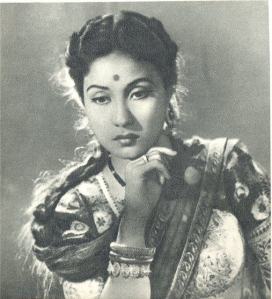GUZRA HUA ZAMANA: REMEMBERING OUR GLORIOUS PAST – EPISODE 37
_____________________________________
For the 37th episode of Guzra Hua Zamana on January 10-11, we have selected Ghulam Haider, a name that evokes a whole lot of respect and gratitude in other legends of HFM. Despite a short career, he has left an indelible mark in the film music scene of the sub-continent. Let’s enjoy and relish his creations on these two days.
On behalf of the SKS family, I would like to express our sincere thanks to Khantha Mahadevan for putting together this fantastic write-up that is not only written so lucidly, but is also one of the most comprehensive account of the maestro’s life and work one would come across anywhere.
_____________________________________

Master Ghulam Haider
MASTER GHULAM HAIDER
INTRODUCTION
The legacy of a composer is determined primarily by the quality of his compositions. The creative beauty and styles used to juxtapose melody, harmony, rhythms into preludes, interludes, vocal, choral and orchestral sections reveal the mastery of a composer. Additionally, a composer can leave behind a rich legacy by introducing new talent, by being an effective teacher, by nurturing fellow musicians, by being a responsible member of the fraternity and by being a role model for younger generation of composers. Most of the best music composers revered by the masses and connoisseurs have left an indelible imprint on utmost a few of the above criteria. Some have reigned supreme for a few decades and have left an immense treasure trove of songs, that, one does not even pause to measure their legacy using any other criteria outlined above. Some have had a short career but each of their musical compositions is so unique that those become their defining legacy. Some composers have won laurels only after their death when the beauty of their compositions has been absorbed.
Amidst the tortuous and fleeting pathways of stardom in the galaxy of Indian film music, there is only one music composer whose name evokes unbridled love, respect, admiration and gratitude. To date, he is regarded as the ultimate mentor, a supreme composer, a trailblazer, an excellent teacher, a superb voice trainer, adviser, a mega talent hunter, and above all, a most beloved human being who cared deeply for the welfare of his singers, musicians and colleagues. This Polaris of film world is none other than Master Ghulam Haider. His career in films spanned a mere eighteen years from 1935 until 1953. He gave music to approximately thirty six films but his legacy is far-reaching that he shall always remain the North Star of film music.
No matter which yardstick is used, Master Ghulam Haider’s legacy is everlasting. Simply put, his knowledge of music was extensive, his ability to recognize vocal talent was extraordinary, his potential to mentor, nurture and groom the juvenile talents he discovered remains unsurpassed, his prophetic statements have come true even beyond his wildest imaginations, his service to fellow composers and the industry remains unforgettable, his treasury of non-film songs is as exquisite as his compendium of film songs, the reverence he commanded from his singers and musicians is unmatched, his revolutionary style of music opened a cosmos of melody, rhythm and fusion that rules the film music world even today. Master Ghulam Haider (MGH) remains the Master of masters of film music.
MGH was a pioneer who was recognized and revered during his brief career and his persona continues to draw glowing tributes even in this seventh decade after his death. A beautifully crafted four-part video tribute, put together by Inaam Nadeem running to a total of 45 minutes (https://www.youtube.com/watch?v=eyOa_KNeyao ) is a recommended must watch to appreciate the enormous influence of MGH. Before elaborating on his short life of 44 years, it is appropriate to quote what famous people have said about their Master. Read the rest of this entry »



